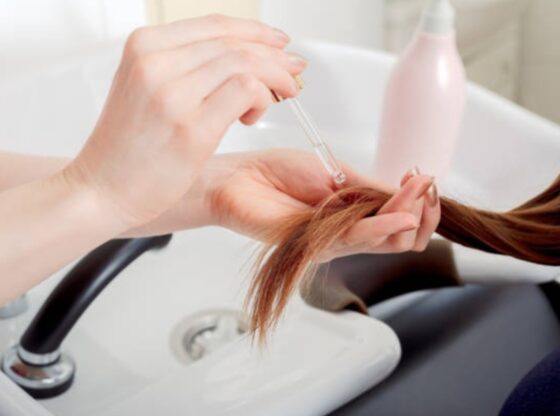Hair care products have evolved significantly over the years, offering a variety of solutions for different hair concerns. Among the most popular are hair serum and hair oil. While both products aim to improve the health and appearance of your hair, they do so in distinct ways. Understanding the differences between hair serum and hair oil can help you make an informed decision about which product to incorporate into your hair care routine.
Hair Serum and Hair Oil: Understanding the Key Differences
1. Composition and Texture
Hair serum is typically a silicone-based product designed to coat the hair’s surface. It has a lightweight, liquid texture that creates a protective barrier around each strand, adding shine and reducing frizz without weighing the hair down. Hair oil, on the other hand, is made from natural oils such as argan, coconut, or jojoba. These oils are heavier and penetrate the hair shaft to nourish and hydrate from within, providing deeper conditioning benefits.
2. Primary Functions and Benefits
The primary function of hair serum is to smooth and protect the hair. It helps manage frizz, adds shine, and can protect against environmental damage and heat styling. Hair serum is excellent for giving the hair a polished, sleek look and is often used as a finishing product after styling. Hair oil’s main purpose is to nourish and moisturize the hair. It deeply conditions, repairs damage, and promotes overall hair health. Hair oil can be used as a pre-shampoo treatment, a leave-in conditioner, or an overnight mask to provide intensive hydration.
3. Application Techniques
Applying hair serum usually involves using a small amount on damp or dry hair. The serum is warmed between the palms and then distributed evenly through the hair, focusing on the mid-lengths to the ends. This method ensures a lightweight finish that doesn’t make the hair greasy. Hair oil can be applied in various ways depending on its intended use. For a pre-shampoo treatment, a generous amount is massaged into the scalp and hair and left for about 30 minutes before washing. As a leave-in conditioner, a few drops are applied to the ends of damp hair.
4. Suitability for Hair Types
Hair serum is particularly beneficial for people with fine or straight hair who want to control frizz and add shine without weighing their hair down. It’s also suitable for those who frequently use heat styling tools, as it offers a layer of protection against heat damage. Hair oil is ideal for dry, curly, or damaged hair that requires deep conditioning and hydration. The natural oils in hair oil can penetrate deeply to repair and nourish, making it a great choice for hair that needs extra care and moisture.
5. Impact on Hair Health
Hair serum provides an immediate aesthetic improvement, making the hair look smoother and shinier. However, it primarily acts on the hair’s surface and doesn’t offer the deep conditioning benefits of hair oil. Hair oil, with its ability to penetrate the hair shaft, can significantly improve hair health over time. It strengthens the hair, reduces breakage, and promotes growth by nourishing the scalp and hair follicles.
6. Frequency of Use
Hair serum can be used daily as part of your regular styling routine. Its lightweight formula makes it suitable for frequent use without the risk of buildup. Hair oil, however, is typically used less frequently, especially if it’s being applied as a deep conditioning treatment. Depending on your hair’s needs, hair oil might be used once or twice a week to provide intensive hydration and nourishment.
7. Heat Protection and Styling
One of the key benefits of hair serum is its ability to protect hair from heat damage. The silicone in the serum forms a protective layer that shields the hair from the high temperatures of styling tools such as flat irons and blow dryers. Hair oil, while nourishing, does not provide the same level of heat protection. It’s better suited for use after styling or as a treatment rather than a styling aid.
8. Environmental and UV Protection
Hair serum often includes ingredients that protect against environmental factors like pollution and UV rays. This makes it a great choice for those who spend a lot of time outdoors or in urban environments where hair is exposed to various pollutants. Hair oil, while providing some natural UV protection, is more focused on hydration and nourishment rather than acting as a shield against environmental damage.
9. Cost and Availability
Both hair serum and hair oil are widely available at various price points, from affordable drugstore options to high-end luxury brands. Hair serum tends to be more expensive due to the inclusion of specialized ingredients designed to provide immediate cosmetic benefits. Hair oil, made from natural ingredients, can also vary in price depending on the type and purity of the oils used.
Conclusion
When deciding between hair serum and hair oil, consider your hair type, specific concerns, and desired results. If you’re looking for a product that provides shine, frizz control, and heat protection, hair serum is the way to go. For those in need of deep hydration, repair, and overall hair health improvement, hair oil is the better choice. Many people find that incorporating both products into their routine at different times yields the best results, addressing immediate styling needs and long-term hair health simultaneously.


